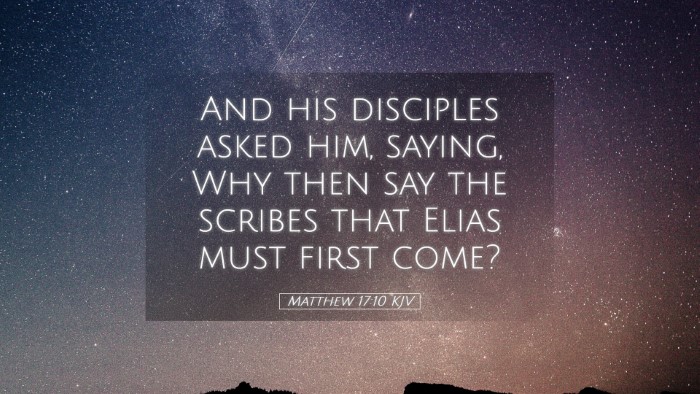Commentary on Matthew 17:10
The verse Matthew 17:10 reads: “And his disciples asked him, saying, Why then say the scribes that Elias must come first?”
This passage occurs in the context following the Transfiguration, where Peter, James, and John witness Christ in His divine glory, along with Moses and Elijah.
The disciples' inquiry about Elijah raises significant theological implications that warrant a careful examination of the dialogue surrounding this verse.
Historical Context
Understanding the background of the disciples’ question is crucial.
The Jewish expectation of Elijah's return before the coming of the Messiah is rooted in the prophets, particularly in Malachi 4:5-6, where it is stated that
“Behold, I will send you Elijah the prophet before the coming of the great and dreadful day of the Lord.” The scribes’ interpretation of this prophecy profoundly influenced
the Jewish messianic expectation during the time of Jesus.
Disciples' Confusion
The disciples' confusion reflects a broader misunderstanding of the nature of Jesus' messiahship and the fulfillment of prophecy.
They had just witnessed a profound revelation of Christ’s identity and glory, yet they were still grappling with traditional interpretations that they had been taught.
Matthew Henry notes that the disciples sought clarification regarding Elijah’s role in the messianic narrative. They were keen to understand how the prophetic
fulfillment they anticipated squared with their experience of Christ’s ministry.
Prophetic Significance of Elijah
The question regarding Elijah signifies the importance of prophetic fulfillment in Scripture.
Albert Barnes emphasizes that the coming of Elijah was not a mere return of the prophet but an indication of the restoration inherent in the messianic age.
The disciples, steeped in their expectations, were eager to reconcile the glory of Christ’s revelation with the prophetic traditions they held dear.
The inquiry highlights their need for deeper understanding of the overarching narrative of redemption.
Jesus' Response to the Question
While the immediate response from Jesus is not included in verse 10, the following verses (Matthew 17:11-13) clarify His teaching surrounding the Elijah prophecy.
Adam Clarke explains that Jesus affirms that Elijah has indeed come in the form of John the Baptist, introducing a revolutionary understanding of the role of
prophetic figures.
This interpretation shifts the disciples’ perspective, suggesting Jesus’ messianic identity is not confined to traditional expectations but fulfills them in a new and transformative way.
Theological Implications
The dialogue surrounding Matthew 17:10 serves to illustrate deeper theological principles about prophecy, fulfillment, and the nature of Jesus’ mission.
-
Prophetic Fulfillment: The relationship between the Old and New Testaments is vividly illustrated here.
John the Baptist serves as a bridge between the two, embodying the prophecy of Elijah as a preparatory figure for Christ.
-
Expectation of the Messianic Age: The disciples’ query illustrates how human expectations can sometimes be misaligned with divine intentions. Their desire for a literal fulfillment
of Elijah’s return underlines the challenge of recognizing Jesus as the ultimate fulfillment of the Law and the Prophets.
-
Transformation of the Covenant: Jesus’ affirmation of John as the fulfillment of Elijah indicates that the covenant’s nature is evolving. The New Covenant inaugurated by Christ
transcends previous understandings and invites a new relationship with God, offering salvation to all.
Conclusion
Matthew 17:10 not only serves as a pivotal moment in the Gospels but also invites contemplation regarding the nature of prophetic fulfillment,
ecclesial expectations, and the richness of Jesus’ messianic identity. The insights drawn from public domain commentaries by Henry, Barnes, and Clarke
enrich our understanding of this text, revealing layers of meaning and application for pastors, students, and theologians today.
It challenges contemporary believers to re-examine their expectations of God’s working in the world and to embrace the transformative nature of Christ’s mission.


